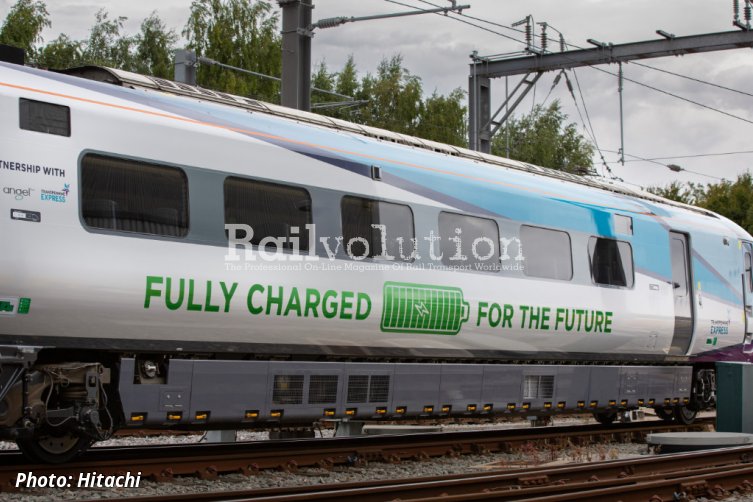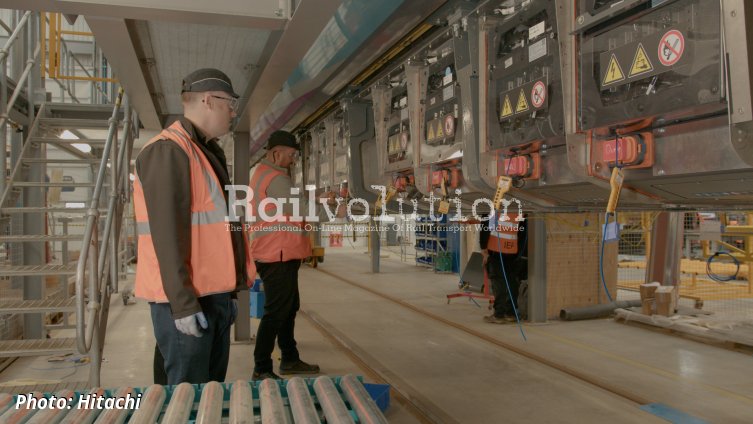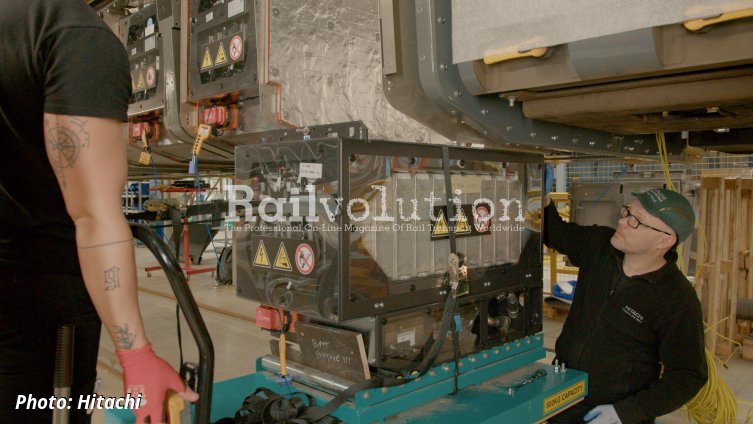Hitachi Rail's battery train completed testing in the north of England
posted on 8th Nov 2024 10:16
On 8 November 2024, Angel Trains, Hitachi Rail and TransPennine Express celebrated the successful completion of the UK’s first intercity battery trial in the North of England, which started in August. The diesel engine is approximately 700 kW peak power, the battery pack had to be able to deliver the same power and performance.
The companies stated that the powerful 700 kW battery technology met, and in some cases even surpassed, the key objectives of the trial, including:
- Fuel costs savings between 35 - 50 %, surpassing previous predictions of up to 30 %,
- Just one battery has managed to power the train to speeds greater than 120 km/h, clearly demonstrating this technology can enter, alight and exit stations solely in zero-emission battery-mode to improve air quality and reduce noise pollution,
- Able to achieve all journey times and performance requirements so can meet operators timetable requirements,
- The battery matches the weight of a diesel engine and is installed in the same undercarriage space, ensuring no risk of track degradation and no impact on the passenger environment.
The successful completion of the trial proves that this battery technology works, providing different applications to deliver cheaper, greener and reliable journeys.
Right now, a single battery enables quieter, zero-emission travel in and out of non-electrified stations. During trials, it powered the train for a mile before and after stations, seamlessly switching back to diesel engines while maintaining performance and journey times. This technology can immediately reduce noise pollution and improve air quality.
Fuel cost savings surpassed expectations. Trial results indicate that a single battery can achieve fuel savings of 35 - 50 %. A range of fuel cost savings can be delivered through train settings, battery usage and driving style. On several occasions during the trial a 50 % saving was achieved when using ‘Eco-mode’ where the battery entirely powers the trains on route sections and alighting in stations. During a trial run, the battery’s impressive power enabled the train to operate solely in battery mode for 70 km. This is more than an adequate range to cover bridges, tunnels, stations, and final stretches of routes.
This success demonstrates that Hitachi Rail is ready to deliver the next stage of a full intercity battery-electric train. Based on real-world data, such a train would have a range between 100 - 150 km. These ranges can cover significant sections of non-electrified routes, eliminating the need for wires in tunnels or stations, and potentially saving hundreds of millions of pounds on electrification projects.
Following testing the diesel engine will be reinstalled so the train can return to passenger service as TransPennine Express need their train back for the December timetable change. However, there are conversations with industry about next steps for the battery.
Hitachi Rail is the only train manufacturer developing a battery product using the UK battery supply chain. A 17 million GBP investment has fostered new skills and expanded the North East supply chain, including partnerships with Turntide Technologies in Sunderland. By focusing on UK innovation and a domestic supply chain, Hitachi Rail is supporting the Government’s Industrial Strategy and growing the battery sector. The company aims to use this battery technology in other trains and large vehicles globally, creating a UK battery export opportunity.
Looking ahead, Hitachi Rail is collaborating with Innovate UK and the University of Birmingham to develop next-generation battery technology, ensuring a range of solutions to meet customer needs. The company is ready to leverage its skills and technology to deliver new battery trains or retrofit existing fleets. Discussions with the Government and the rail industry are underway to determine the next steps for this technology.
This important project draws upon Hitachi’s global battery expertise which includes delivering the world’s first passenger battery train in Japan, and rolling out the Masaccio, Europe’s first battery hybrid train in Italy in 2022. The evolution of the technology continues at pace with Hitachi Rail recently unveiling its new intercity version of the train, and with a target to roll out a new EuroMasaccio platform in additional European markets.




